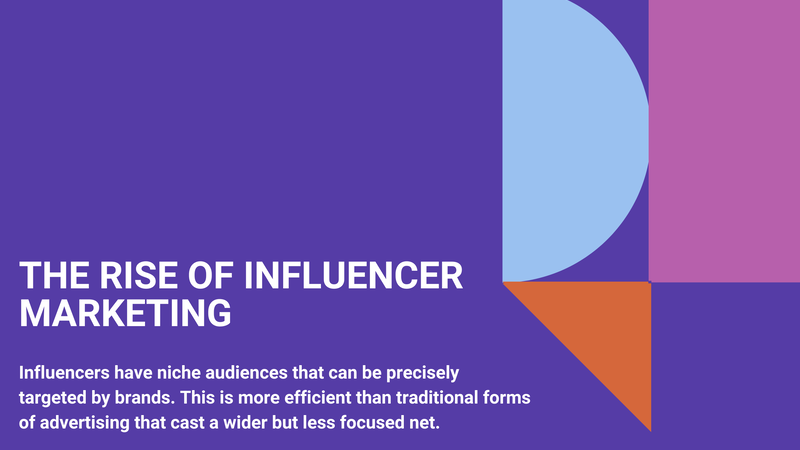Key Takeaways:
- In the age of advertising, brands are utilizing influencer marketing as a valuable tool to connect with specific consumer groups.
- It helps build brand trust and increase engagement.
- Effective strategies include selecting the right influencers and measuring ROI.
- Case studies and data show the positive impact of influencer collaborations.
What is Influencer Marketing?
Collaborating with individuals who have a significant online following to promote products or services is known as influencer marketing. These influencers can range from celebrities with millions of followers to niche experts who have smaller but highly engaged audiences. The core idea is that these influencers, through their content, can sway the purchasing decisions of their followers. According to Forbes, influencer marketing will grow substantially in the coming years.
The Benefits of Influencer Marketing
Expanding a brand’s reach to a broader audience is a major benefit of using influencer marketing. Influencers command the attention of loyal followers who often trust their recommendations. This increased level of confidence leads to higher engagement rates because followers are more likely to interact with content that features products or services recommended by their favorite influencers. Based on a study conducted by Mediakix, 89% of marketers claimed that the return on investment achieved through influencer marketing is on par with or surpasses that of other marketing platforms. This higher engagement often manifests in likes, comments, shares, and direct messages, exponentially boosting a brand’s visibility and credibility. Platforms that offer transparent and competitive Valued Voice pricing can facilitate finding the right influencers for your brand, making it easier to tap into this growing trend.
Selecting the Right Influencers
Selecting the correct influencer is essential for the effectiveness of a marketing campaign. Brands should look for influencers whose audience demographic aligns with their target market. This involves scrutinizing metrics like follower count, engagement rate, and audience demographics. Tools and platforms can help identify suitable influencers, offering comprehensive analytics to match brand objectives with appropriate influencers. For instance, a brand selling eco-friendly products would benefit more from partnering with an influencer who advocates for sustainability rather than a generic lifestyle influencer. HubSpot offers valuable tips on collaborating effectively with influencers, ensuring the partnerships are strategically sound and creatively fulfilling.
Implementing Effective Strategies
Brands should create authentic collaborations that resonate with the influencer’s audience. This might involve sponsored posts, product reviews, giveaways, or live sessions where influencers use and talk about the brand’s products. The goal is to maintain a balance between promotional content and genuine engagement. For example, an influencer might share a personal story that ties into a brand’s message, making the promotion feel organic rather than forced. Clear agreements and expectations should be set before any collaboration to ensure both parties are satisfied with the partnership. These agreements should cover content guidelines, posting schedules, and performance metrics to track the campaign’s effectiveness.
Measuring Success and ROI
Determining the effectiveness of an influencer marketing strategy may be difficult, but it is crucial to grasp its influence. Brands must track various metrics, such as reach, engagement, and conversions, in order to evaluate the effectiveness of their campaigns. Invaluable data can be provided by tools like Google Analytics and social media analytics. For example, a spike in website traffic or sales following an influencer’s post can strongly indicate campaign success. Brands can use these insights to refine future strategies, making data-driven decisions. Additionally, setting specific, measurable goals beforehand can help accurately assess the campaign’s return on investment (ROI).
Case Studies and Data
Several brands have successfully leveraged influencer marketing to achieve their business goals. For instance, a beauty brand saw a 70% increase in sales after collaborating with a famous makeup artist on Instagram. The collaboration involved the influencer creating makeup tutorials using the brand’s products, effectively showcasing their quality and versatility. Such campaigns highlight the potential return on investment, with the influencer’s reach translating directly into increased product sales. These case studies serve as compelling evidence of the efficacy of influencer marketing, encouraging other brands to explore similar strategies.
Challenges and How to Overcome Them
Despite its benefits, influencer marketing comes with its set of challenges. These include finding genuine influencers who align with the brand’s values, managing collaborations, and dealing with inconsistent results. Brands can overcome these challenges by conducting thorough research, setting clear objectives, and using reliable tools for campaign management. Furthermore, ensuring ongoing communication with influencers helps to ensure that both parties have the same objectives and expectations. Brands should also be prepared to adapt their strategies based on performance data, making necessary adjustments to improve future campaigns.
Future Trends in Influencer Marketing
As the digital landscape evolves, influencer marketing trends continue to shift. Emerging trends include the rise of micro-influencers with smaller but highly engaged audiences and the increased use of video content, which often performs better in engagement. There’s also a growing emphasis on authenticity, with audiences favoring genuine and transparent influencers. Staying updated with these trends will help brands remain competitive and effectively leverage influencer marketing to achieve their business goals.
